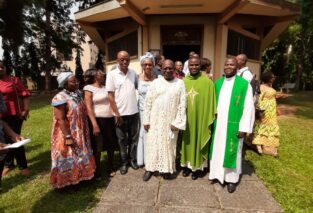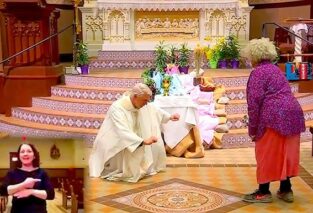(First carried as an editorial in L’Effort camerounais # 378, May 2006).
“Seventy is the sum of our years, or eighty if we are strong,” sings the Psalmist, before lamenting that many of these years constitute “fruitless toil, for they pass quickly and we drift away” (Ps 90:10).
The United Nations Organisation, as if guided by this Psalmist’s lament over the brevity and harshness of life, challenged humanity to give the elderly a chance by declaring 1999 as “The International Year of Older Persons.”
The world organisation strongly urged modern humanity to thoroughly assess its actions towards this group of persons who, to borrow the hauntingly-beautiful words of Pope Saint John Paul II, are now “in the process of gradual maturing along the path to eternity”.
The United Nation’s challenge seemed to have jolted mankind out of its stupor and it suddenly dawned on many that we have let down those among us who, in the words of the famous Roman orator, Cicero, are in “the autumn of life.” Governments, religious and social organizations, NGOs and the media alike were caught off-guard and some of them, seeing the enormity of their neglect of their elderly population, and as if to give their consciences a respite, began to wonder what the fuss was all about anyway, given that old age is a natural process of life.
As perplexed humanity continued to ponder what appropriate reaction to give to the UN’s mind-jolting challenge, Pope John Paul II, already in “the autumn of life” himself, quickly set the tone with a tender letter to the elderly.
He began by justifying the need for such a letter. “I am writing this letter to you in the year which the United Nations Organization has appropriately wished to dedicate to the elderly, in order to direct the attention of society as a whole to the situation of all those who, because of the burden of their years, often have to face a variety of difficult problems,” notably ill health, abandonment and loneliness.
He then deplored the fact that in the Western world, the elderly have been largely neglected and relegated to the fringes of society. This contempt for ageing humanity has been so intense that some individuals, and even states, do not hesitate to propose euthanasia (mercy killing) as a solution to get some difficult cases, especially the very sick ones, out of the way. But, warns the Holy Father, “regardless of the intention and circumstances, euthanasia is always an intrinsically evil act, a violation of God’s law and an offence against the dignity of the human person.”
If the Western world still continues to relegate its elderly to the fringes of society, what is Africa, as a whole, and Cameroon, in particular, doing for our own ageing population? That is the question? In fact, when the United Nations declared 1999 “The International Year of Older Persons”, there were many in Africa who snickered at the idea. Why, they wondered, should Africa care when less than 3% of its population ever attains the age of 65 years?
But, those who think this way may soon be in for a rude awakening. During the Third Regional Workshop of the African Gerontological Society, held in Nairobi, Kenya in April 1999, Dr. Alex Kalache, head of the “Ageing and Health Programme” at the World Health Organisation in Geneva, stunned participants with the revelation that the ageing population throughout the world was in the increase and that “these changes are likely to accelerate in the next century, when Africa too will have experienced a significant ageing process” (New People Magazine, No 62, Sept/Oct 1999, p. 14).
Africa looks at its elder population in two different lights. Traditional society continues to esteem the elderly, in the words of John Paul II, as “living encyclopaedias of wisdom, guardians of an inestimable treasure of human and spiritual experiences.” The Malian writer, Hampaté Ba, once said that “the death of an old person is like a library that is burnt down by fire.” This supports the Holy Father’s view that our elders are “the guardians of our collective memory, and thus the privileged interpreters of that body of ideals and common values which support and guide life in society.” Traditional Africa, therefore, still “rises in the presence of one with grey hair; and honours the person of the older man” (Lev 19:32), because such an individual remains the pillar of the family and of the society.
If Africa of tradition still holds the elderly in awe and respect, the rapidly urbanizing Africa, for its part, is developing what John Paul II calls “a mentality which gives priority to immediate human usefulness and productivity”, which thus excludes the elderly. Everywhere, we see the sacred respect that is usually given to the aged being eroded away as society increasingly considers the old as useless appendages to be put away in retirement homes. Many of them become victims of memory loss (Alzheimer’s disease) and can be seen in many of our cities, roaming the streets in real destitute situations.
The recent issue of L’Effort camerounais # 377, dedicated to retirement in Cameroon, reveals the uncaring attitude of public authority to people who have spent a good part of their lives working for government but who are quickly abandoned to themselves when the moment to rest comes. More often than not, they fall victim to the greatest enemy of old age in Africa, that is, poverty. They become victims of loneliness, of abandonment and of ill health, especially as traditional family ties are weakening with the alienating effects of individualism in modern cities.
The Ministry of Social Welfare has a whole department dedicated to action in favour of the elderly in our midst. Is it doing enough in that area? Religious authority, notably some Catholic organizations and volunteer groups are devoting considerable time to the care of the aged in our midst. Can they do more? Our elders, who are now standing on “the threshold of eternity”, need us more now than ever before. Are we doing enough to help them on the last lap of their pilgrimage towards our heavenly home?


